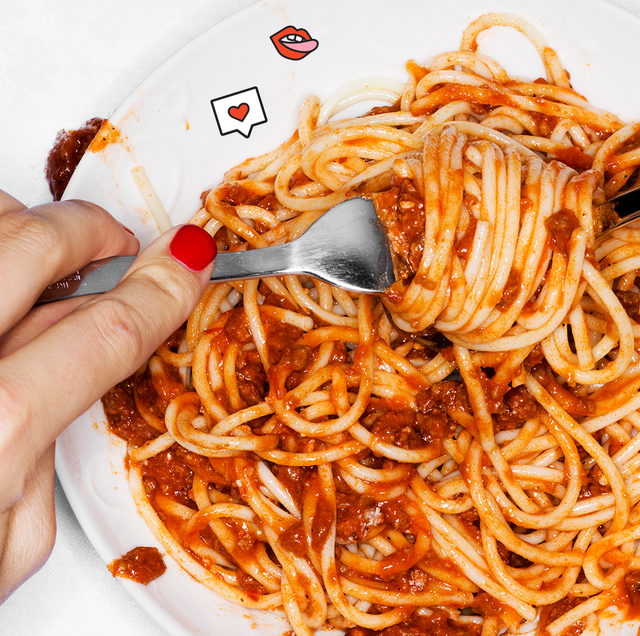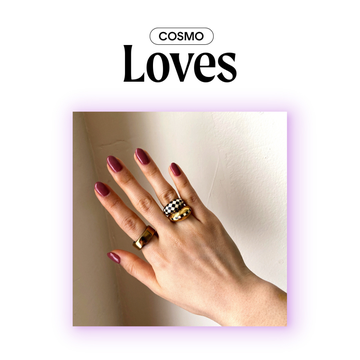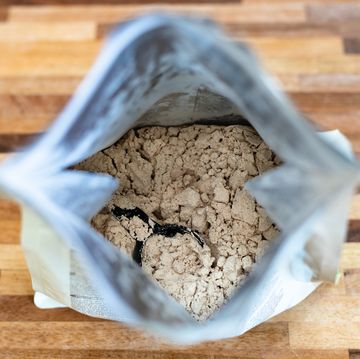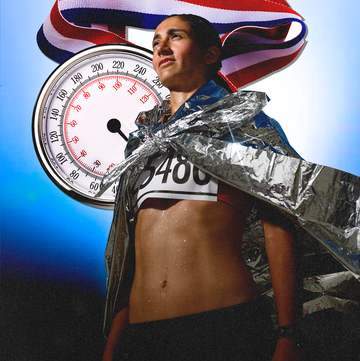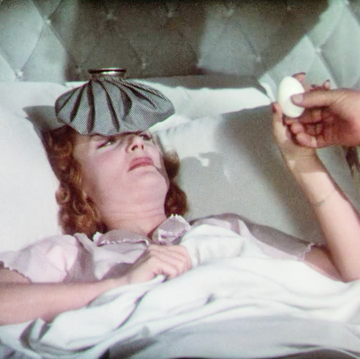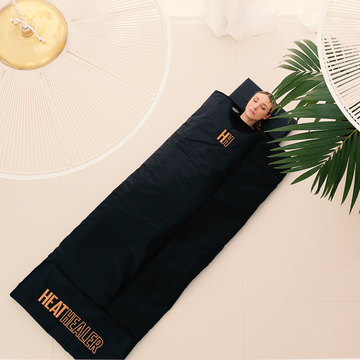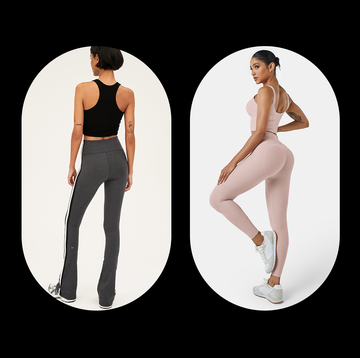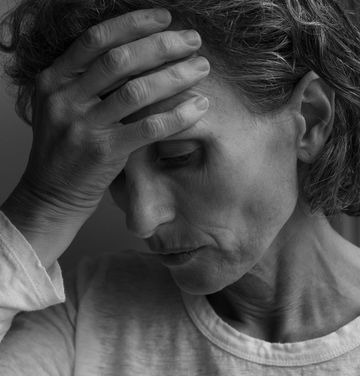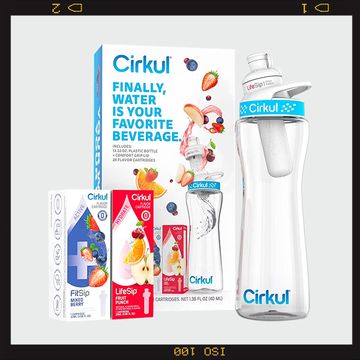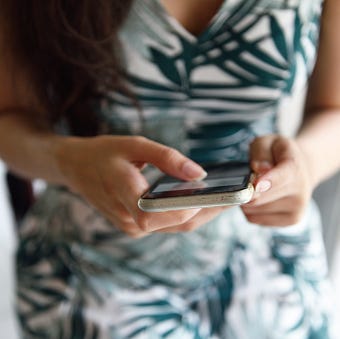This article was reviewed by Alissa Rumsey, registered dietitian, certified intuitive eating counselor.
First, you should know there's no exact way to tell why you want to eat a particular food at a particular time. Cravings are caused by a number of factors, like nutritional deficiencies or needs and your environment (see: smelling freshly baked bread or seeing someone eat a thing that looks delicious). However, many food cravings are a direct result of restrictive eating or limiting certain foods.
If you're cutting way back on certain foods or food groups, like bread or sugar, eventually your body's starvation mechanism kicks in, making you really, really want those foods you've avoided, says registered dietitian, Alissa Rumsey, a certified intuitive eating counselor and author of Unapologetic Eating.
“To your body, food restriction feels like starvation," Rumsey says. "So even if you’re surrounded by plenty of food, your body is wired to respond by increasing your appetite and increasing food cravings.”
Cravings also happen when you frequently ignore hunger cues or wait until you're ravenous before eating. Again, your body is trying to make sure you have enough energy, so when you wait too long to eat you may notice more intense cravings.
And while food cravings aren't a great way to tell if you're experiencing a health issue or nutritional deficiency, eating what you crave and putting those cravings into context helps your bod get what it needs. Consider these factors the next time you just really want THAT food.
When you want a very specific food
You're reacting to a sensory cue or an emotional trigger.
When you develop a late-night craving for white pizza after a big bar night out, it's probably not because your body needs calcium from the mozzarella. More likely, it's because you ended every Saturday night in college at the campus pizza joint eating that same slice. And that’s nothing to feel guilty about.
You're denying yourself that food.
Obviously, cutting specific foods out of your diet makes you want that food even more. This is why you should allow yourself to eat all the foods. “The more you allow yourself to eat, the more your body trusts that you can—and will—eat it whenever you want, so it becomes less compelling,” Rumsey says. “The sense of scarcity disappears, you get used to it being around, and the urgency and craving to eat it goes away.”
When you want chocolate
You're getting your period, you're pregnant, or you're having a shitty day.
Because diet culture vilifies chocolate as a high-calorie, high-fat food, people tend to crave chocolate at times when they think it's socially acceptable to eat it, explains Julia M. Hormes, Ph.D., assistant professor of psychology at the University at Albany, State University of New York.
So if you've heard that raging hormones make you crave chocolate or that chocolate contains special chemicals that improve your mood, you may crave it when your period is on its way or after a particularly bad day. “Food can be a really helpful coping mechanism, so it makes sense that you may turn to it when you are having a bad day,” says Rumsey. “You may be trying to comfort yourself and often chocolate does just the trick!”
You're on a diet that's too restrictive.
“Cravings are often the result of trying to limit or stay away from certain foods,” Rumsey says. “If you restrict certain foods or try to keep them out of your house, it makes these foods more exciting and desirable.” So it makes sense that, when you finally get access to those foods, you find it hard to stop eating. And when you're hungry from restricting calories, your body registers chocolate—a food that's calorically dense—as a perfect food to eat lots of.
When you want candy
You're pre-diabetic.
This is only a real risk if your candy cravings are accompanied by the increased urgency to pee, and if your sugar cravings are extreme and chronic, says Joseph Colella, M.D., a Pittsburg-based robotic/bariatric surgeon and author. (If you're concerned, see your doctor for a blood test.)
You're getting or you have your period.
Any change in hormone levels can increase sugar cravings (it's not a myth)—and it’s totally fine to listen to what your body wants!
You’re not eating enough.
Craving candy may be related to what you are eating (or not eating) earlier in the day. If you're not eating enough, especially during the first part of the day, you may notice increased cravings for candy later in the day. Sugar is a concentrated source of energy so when you’re not eating enough energy, you may experience sugar cravings to get that energy boost.
You're stressed as hell.
Eating carbs and sugar increases levels of serotonin in your brain, says Rumsey—your cravings are a survival mechanism just trying to help you feel better!
When you want pasta and bread
You're actually craving sugar.
(See candy above.) Carbohydrate-rich foods break down into sugar in our bloodstream. If you're craving sugar, but eat something “healthier” instead, you may notice yourself reaching for things like bread and pasta.
You’re not eating enough carbs—our bodies’ best source of energy.
Fun fact: Your brain needs the equivalent of about three cups of pasta per day to function optimally.
“Carbohydrates in food are broken down into glucose, which provides fuel and energy for your body,” Rumsey explains. “Your body can only store enough glucose to provide energy for three to eight hours. After that, you need to eat more carbs.”
When you want ice cream
You might be taking too many OTC pain relievers.
Non-steroidal anti-inflammatory drugs like naproxen and Motrin are low-key harmless, but they can actually cause some inflammation in the stomach, according to Dr. Colella. An ice cream craving could be your body's way of expressing irritation—and a sign it needs a break.
You're tired.
Ice cream, milk, and yogurt contain natural milk sugars that give you a quick boost of energy. If you need a pick-me-up and happen to love ice cream, it might be the first food you think about.
When you want a salty snack
You're dehydrated.
Thirst is often masked as hunger. So a craving for salt, which helps your body retain water, could mean you aren't drinking enough or you are losing water faster than you're ingesting it—through sweating, diarrhea, or vomiting, for example.
You're stressed.
Many salty foods—like chips, crackers, and pretzels—are crunchy. Eating crunchy foods can help relieve stress, Dr. Colella says.
Your mouth is bored.
If your favorite salty foods are also crunchy, it's possible your salivary glands and the muscles in your jaw want a little more stimulation, says Dr. Colella.
When you want a steak or a burger
You're not eating enough protein.
If you eat mostly vegetarian or work out a ton. Few people who weight-train eat enough protein, Dr. Colella says. On days when at least 50 percent of your workout involves resistance-training (bodyweight exercises count!), try to eat about one gram of protein for every pound you weigh, he suggests.
You have a chronic iron or vitamin B deficiency.
If you get heavy periods, that can leave you short on iron. If you don't eat quite enough protein (a good source of iron) and skimp on it consistently, your hankering for meat could mean your body is short on essential nutrients.
When you want fries or tendies (any fried stuff, really)
You're sleep-deprived.
Lack of sleep leaves you low on energy and food provides energy to fuel your every move, so it's easy to confuse exhaustion and hunger. Your brain knows these foods activate your reward center for a satisfying sense of fullness, Dr. Colella says.
When it's cheese
You're not getting enough calcium or vitamin D.
Cheese and other dairy foods contain both nutrients, and it's not uncommon to eat insufficient amounts of them.
You don't eat enough fat.
Cheese is a good source of this essential nutrient—and it's only natural to gravitate toward the gooiest and most delicious source.

Elizabeth Narins is a Brooklyn, NY-based writer and a former senior editor at Cosmopolitan.com, where she wrote about fitness, health, and more. Follow her at @ejnarins.
